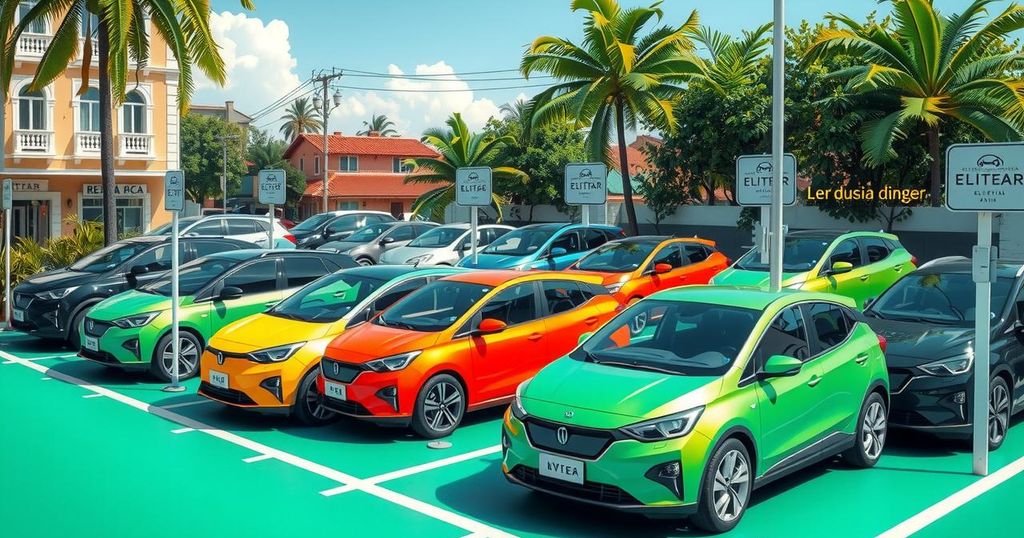BYD Increases Electric Vehicle Shipments to Brazil Before Tariff Hikes

BYD is significantly increasing its electric vehicle shipments to Brazil ahead of upcoming tariff hikes. Sales for electric and hybrid vehicles are on the rise, but local automakers express worries about BYD’s commitment to production in Brazil amid changing tariff structures and labor issues. The situation raises concerns about the development of local industry infrastructure.
In a significant move ahead of impending tariff hikes, BYD is drastically increasing its electric vehicle (EV) shipments to Brazil. The company is facing an uncertain future regarding its production plans in the country, as reported by Reuters. Sales for fully electric and hybrid vehicles have jumped, with projections indicating over 170,000 units in 2024—a remarkable 85% increase, according to the Brazilian Association of Electric Vehicles (ABVE).
BYD, which has captured a large share of this growth, saw its sales soar by about 328 percent last year, totaling nearly 76,713 units in Brazil. However, a favorable tariff regime that initially attracted BYD to Brazil back in 2015 is about to change. Imported EVs, which enjoyed tariff-free status for a decade, will now be subjected to a new set of progressive tariffs starting at 10 percent in January 2024, potentially climbing to 35 percent by mid-2026.
At present, tariffs sit at 18 percent and are expected to rise to 25 percent by July, influenced by intense lobbying from Brazil’s auto manufacturers association, Anfavea, which is pushing for even quicker tariffs reaching the peak. A government spokesperson stated that this request is currently under consideration.
Chinese automakers are anticipated to ramp up exports to Brazil by almost 40 percent this year, reaching around 200,000 units. Reports indicate that BYD has already shipped around 22,000 vehicles this year alone. As part of this push, they employed the world’s largest car-carrying ship last month. Additionally, aiming to maximize benefits from a government policy that allows toll-free imports for specific EVs, BYD is frontloading imports to take advantage of exemption thresholds.
However, while consumers show enthusiasm for these economical EVs, local Brazilian automakers are voicing concerns. They fear that the surge in imports signals BYD’s retreat from its commitment to build a production facility in Brazil. A plant acquired from Ford ran into substantial issues last December, when authorities rescued 163 construction workers from poor conditions at the site. Although BYD cut ties with the contractor responsible, the situation has delayed its production timeline to December 2026.
Igor Calvet, the president of Anfavea, shared insights on the matter, stating, “We support the arrival of new brands in Brazil to produce, promote the components sector, create jobs and bring new technologies. But an overabundance of imports causing reduced investment in local production is concerning.”
He highlighted that no local supplier relationships have been formed or contracts signed, which is atypical for a company preparing for production. The lack of local component production raises questions about the actual value added to the Brazilian market. On a brighter note, fellow Chinese company GWM is preparing to produce its hybrid Haval H6 SUV next month. GWM’s director of government relations, Ricardo Bastos, emphasized that while discussions with around 100 local suppliers are in progress, the necessary infrastructure to support comprehensive component production in Brazil is still lacking.
In summary, BYD’s increased exports to Brazil indicate a strategic move to benefit from changing tariff conditions while facing uncertainty around its local production plans. Despite mounting sales figures for electric vehicles, the looming hikes in tariffs set against a backdrop of local automaker concerns suggest a challenging road ahead for foreign EV manufacturers. The future of BYD’s commitment and the development of local supply chains in Brazil remains to be seen, especially considering the situation with labor issues impacting timelines.
Original Source: macaonews.org




